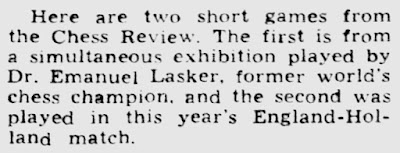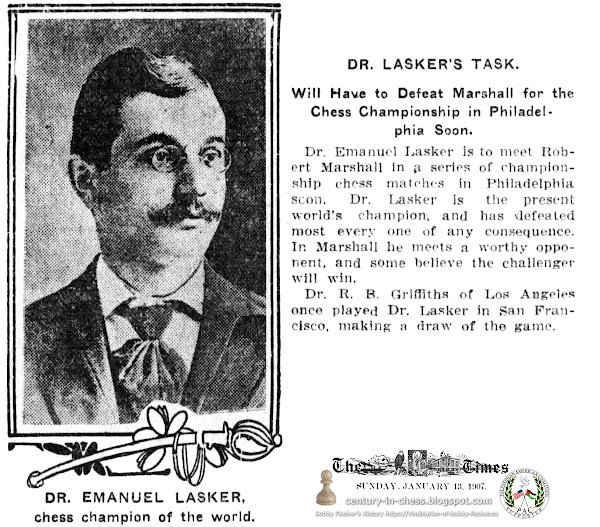1908
Schachjahrbuch für 1908 by Ludwig(?) Bachmann (Ansbach, 1909), whose caption correctly identified the two masters, Siegbert Tarrasch and Emanuel Lasker, and notes the photo was taken in Munich during the 1908 world championship match. Source
Lasker vs Tarrasch 1908, Düsseldorf / Munich
Emanuel Lasker and Siegbert Tarrasch
Frontispiece to The Championship Match: Lasker v. Tarrasch by L. Hoffer, London, 1908. Source
October 12 1908
Birmingham Post-Herald, Birmingham, Alabama, Monday, October 12, 1908
How Emanuel Lasker Grew To Be a Master
Of Dr. Emanuel Lasker, world's champion chess player, who recently won a series of games from Dr. Tarrasch of Germany for the championship of the world Prof. Kewitsch, his instructor in mathematics at college, says:
“Lasker was born on December 24, 1868, at Berlinchen, a small city in the Neumark, where his father, as an employee of the synagogue, had a precarious existence, which, however, did not rob him of the pleasure of playing the royal game with his sons. In his case it is against demonstrated that giftedness in a family for a certain art increases from generation to generation, until one member of the family, aided by special circumstances, climbs the summit of ability.
“With the aid of relatives and members of their faith, the parents succeeded in giving their sons a higher education. The older, Berthold, also a famous player, is a physician. The younger had to quit school from Obertertia when all means were exhausted. A commercial career was intended for him, but for this he was unfitted.
“But they succeeded in sending him to another school, at Landsberg, where he skipped a class and in three months was promoted to prima. After two years at Easter in 1888 Lasker passed his Abiturium examination.”
Here Prof. Kewitsch repeats the four difficult questions in mathematics and geometry submitted to the students.
“While the other scholars were busy during the allotted five hours Lasker was through in two hours. This rapidity astounded me, and instead of letting him go I gave him another problem to solve, one so difficult I thought it would worry him. Lasker solved this one also, within the remaining three hours.
“I will state that he was brighter in arithmetic than in geometry. His ability in drawing was inferior, but his power of combination was extraordinarily developed.
“Now to chess. I was president of the Landsberg Chess club and considered the best player there, but that means little. On the quiet, Lasker had played with several members and desired to join the club; but, being a student, it was impossible. He was anxious to play with me, but I had to reply: ‘Dear Lasker, business first, then pleasure, your school must not suffer.’ He was not accustomed to order, and worked irregularly—sometimes not at all, then the whole night. The school regulations were a disagreeable fetter to him and I had my troubles.
“But in the summer, during the customary class excursion, he again requested me to play and produced a pocket chess board. I consented and we played on the match, the board passing from one to the other. At first I thought he was not such a much. But the game suddenly took a turn presaging my death and I resigned. Quick to the second game; but now attention! No underestimation of the adversary! I lost that also, and—the day being long—the third and the fourth.
“Then I wished him success in his future battles and recommended Bilguer's handbook for his further guide, but warned him not to play chess all the time—at the university mathematical studies must remain the main thing. He probably would have followed this advice had he not been compelled by necessity to adopt chess playing as a means of a livelihood. I say probably, because already at that time I noticed in him a longing for public fame. It was not long thereafter when the newspapers reported a new star in the chess firmament. Lasker won in England, in America, and in 1894 defeated Steinitz for the championship of the world.
“Lasker is a professional player. He lives by this work, and it is hard work. A champion, he was in the happy position to dictate conditions for the match with Tarrasch, and this he did in a thorough manner.”






























































